03 Nov 17 | Campaigns -- Featured, Media Freedom, Statements
[vc_row][vc_column][vc_column_text]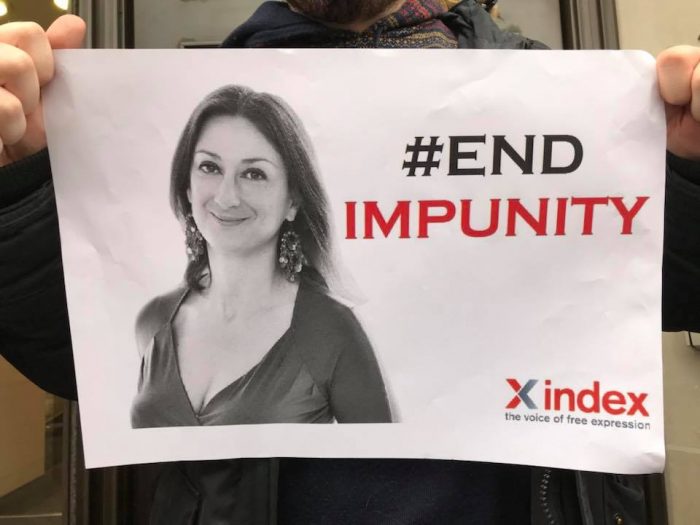 Nearly 60 free expression advocates marked the International Day to End Impunity for Crimes Against Journalists by honouring the courage of investigative journalist Daphne Caruana Galizia, and call for justice in her case.
Nearly 60 free expression advocates marked the International Day to End Impunity for Crimes Against Journalists by honouring the courage of investigative journalist Daphne Caruana Galizia, and call for justice in her case.
Caruana Galizia was tragically killed on 16 October when a bomb placed under her car exploded as she drove away from her home in Bidnija, in the north of the island of Malta. A specialist in investigating corruption, her work included exposés of the shady secret deals, uncovered in the Panama Papers, that show how politicians and others hide illicit wealth behind secret companies. Her allegations about government corruption led to early elections in the country last June.
“Daphne Caruana Galizia showed remarkable courage in relentlessly pursuing investigations into official corruption and publishing stories that some clearly wanted to keep hidden, for which she paid the ultimate price. We call for justice for Daphne, and for an end to the vicious cycle of violence against journalists and impunity for their attackers everywhere it occurs. An attack on a journalist anywhere is an attack on journalism itself”, said Rebecca Vincent, UK Bureau Director for Reporters Without Borders.
“Daphne Caruana Galizia embodied the courage and commitment of independent journalists everywhere to bring us the news and illuminate inconvenient truths at great risk. Her cowardly murder must not go unpunished. Today we stand with Caruana Galizia’s family, friends, and colleagues, in the pledge to seek justice for her and for all journalists who have paid the ultimate price simply for doing their job”, said Nina Ognianova, Europe and Central Asia Programme Coordinator for the Committee to Protect Journalists.
“For decades, leading investigative journalist Daphne Caruana Galizia fought courageously to uncover corruption in her native Malta, in spite of ongoing intimidation, threats, lawsuits and attacks on her family home. Following her brutal murder, it is crucial that we come together to pay tribute to her bravery, to call for a full and impartial investigation, and to continue her legacy”, said Cat Lucas, Writers at Risk Programme Manager for English PEN.
“We are shocked and saddened at the death of Daphne Caruana Galizia. It’s important and necessary that we acknowledge her today and moving forward to pay tribute to her bravery in fighting corruption in her country. Her tragic death will serve as a stark reminder of the dangers journalists around the world face every day in doing their important work”, said Laura Gane, Editorial Director of the Frontline Club.
“The murder of a prominent investigative journalist in broad daylight in an EU Member State underscores the seriousness of this crime. Daphne Caruana Galizia’s work as a journalist to hold power to account and shine a light on corruption is vital to maintaining our democratic institutions. Her killing is a loss for her country and for Europe”, said Hannah Machlin, Project Manager for Index on Censorship’s Mapping Media Freedom programme.
“Daphne Caruana Galizia was a lone but important voice, and her death leaves a void in a country that urgently needs to address the growing widespread perception that it is failing in its efforts to end corruption”, said Patricia Moreira, Managing Director of Transparency International.
Co-sponsors of the London vigil included ARTICLE 19, the Committee to Protect Journalists, English PEN, Frontline Club, Index on Censorship, PEN International, Reporters Without Borders, and Transparency International.
Malta is ranked 47th out of 180 countries in Reporters Without Borders’ 2017 World Press Freedom Index, and 47th out of 176 countries in Transparency International’s Corruption Perception Index 2016.[/vc_column_text][/vc_column][/vc_row][vc_row][vc_column][vc_row_inner][vc_column_inner width=”1/2″][vc_single_image image=”80577″ img_size=”full” onclick=”custom_link” link=”https://www.indexoncensorship.org/newsite02may/2017/10/impunity-crimes-against-journalists-unresolved/”][/vc_column_inner][vc_column_inner width=”1/2″][vc_column_text]
Index on Censorship and Reporters Without Borders have highlighted prominent cases of impunity.[/vc_column_text][/vc_column_inner][/vc_row_inner][vc_row_inner][vc_column_inner width=”1/2″][vc_single_image image=”96085″ img_size=”full” onclick=”custom_link” link=”https://www.indexoncensorship.org/newsite02may/2017/10/daphne-caruana-galizia-life-and-career/”][/vc_column_inner][vc_column_inner width=”1/2″][vc_column_text]
Daphne Caruana Galizia was a Maltese journalist and blogger known for her investigative reporting on controversial and sensitive information.[/vc_column_text][/vc_column_inner][/vc_row_inner][vc_row_inner][vc_column_inner width=”1/2″][vc_single_image image=”96373″ img_size=”full” onclick=”custom_link” link=”https://www.indexoncensorship.org/newsite02may/2017/10/international-press-freedom-groups-condemn-killing-maltese-investigative-journalist/”][/vc_column_inner][vc_column_inner width=”1/2″][vc_column_text]
Sixteen press freedom groups condemn the killing of investigative journalist Daphne Caruana Galizia and demand an immediate and independent investigation into her death.[/vc_column_text][/vc_column_inner][/vc_row_inner][vc_custom_heading text=”Mapping Media Freedom” use_theme_fonts=”yes”][vc_separator color=”black”][vc_row_inner][vc_column_inner width=”1/4″][vc_icon icon_fontawesome=”fa fa-times-circle” color=”black” background_style=”rounded” size=”xl” align=”right”][/vc_column_inner][vc_column_inner width=”3/4″][vc_column_text]
Since 24 May 2014, Mapping Media Freedom’s team of correspondents and partners have recorded and verified 3,597 violations against journalists and media outlets.
Index campaigns to protect journalists and media freedom. You can help us by submitting reports to Mapping Media Freedom.[/vc_column_text][/vc_column_inner][/vc_row_inner][vc_separator color=”black”][/vc_column][/vc_row][vc_row][vc_column][vc_custom_heading text=”Don’t lose your voice. Stay informed.” use_theme_fonts=”yes”][vc_separator color=”black”][vc_row_inner][vc_column_inner width=”1/2″][vc_column_text]Index on Censorship is a nonprofit that campaigns for and defends free expression worldwide. We publish work by censored writers and artists, promote debate, and monitor threats to free speech. We believe that everyone should be free to express themselves without fear of harm or persecution – no matter what their views.
Join our mailing list (or follow us on Twitter or Facebook) and we’ll send you our weekly newsletter about our activities defending free speech. We won’t share your personal information with anyone outside Index.[/vc_column_text][/vc_column_inner][vc_column_inner width=”1/2″][gravityform id=”20″ title=”false” description=”false” ajax=”false”][/vc_column_inner][/vc_row_inner][vc_separator color=”black”][/vc_column][/vc_row]
02 Nov 17 | Events
[vc_row][vc_column][vc_column_text]Join Index on Censorship for a talk on freedom of expression and censorship in publishing, as part of the conference Publishing – A Brave New World? organised by the Society of Young Publishers.
Jemimah Steinfeld, deputy editor of Index on Censorship magazine, will discuss the current challenges facing the book industry. Joining her on the panel will be Jo Glanville, former director of English PEN and Theo Jones, Publishing Contacts Advisor at the Society of Authors.
For more information on the programme and conference click here.[/vc_column_text][/vc_column][/vc_row][vc_row][vc_column width=”1/3″][vc_single_image image=”88892″ img_size=”full” add_caption=”yes”][/vc_column][vc_column width=”1/3″][vc_single_image image=”96365″ img_size=”213×142″ add_caption=”yes” alignment=”center”][/vc_column][vc_column width=”1/3″][vc_single_image image=”96364″ img_size=”213×142″ add_caption=”yes” alignment=”center”][/vc_column][/vc_row]
02 Nov 17 | Europe and Central Asia, Malta, Mapping Media Freedom, Media Freedom, media freedom featured, News and features
[vc_row][vc_column][vc_column_text]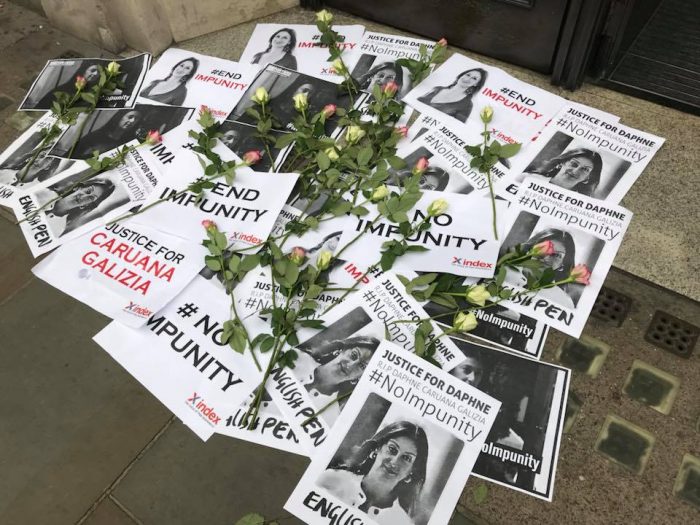
On 2 November, the International Day to End Impunity for Crimes Against Journalists, Index joined activists and five other organisations for a vigil outside the High Commissioner’s Office of Malta for murdered journalist Daphne Caruana Galizia.
Caruana Galizia was one of the best-known journalists and bloggers in Malta, recognised for her fearless reporting on controversial information surrounding government corruption. On 16 October 2017 Caruana Galizia was murdered in a car bomb attack near her home.
“The murder of a prominent investigative journalist in broad daylight in an EU member state underscores the seriousness of this crime,” said Hannah Machlin, project manager for Index on Censorship’s Mapping Media Freedom programme. “Daphne Caruana Galizia’s work as a journalist to hold power to account and shine a light on corruption is vital to maintaining our democratic institutions.”
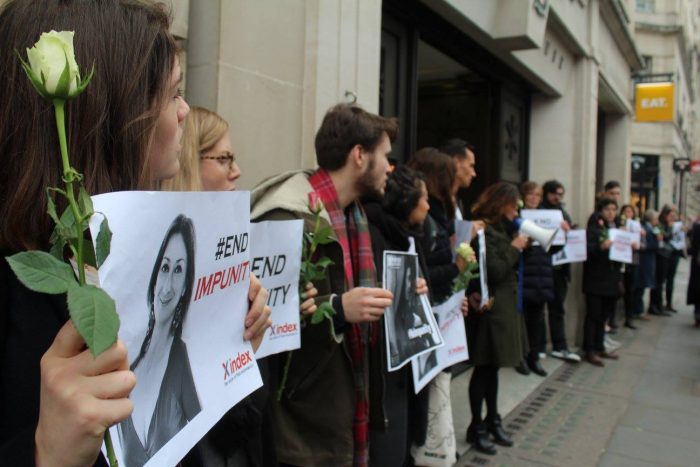
Credit: Cat Lucas / English Pen
Galizia’s blog, Running Commentary, often generated more readers than all of the country’s newspapers combined. At the time of her death, over 40 libel suits had been taken out against her. According to her son, death threats were almost a daily occurrence.
“She knew there was a price to pay, but I never thought it was going to be this,” Gabriel Fraga, a friend of Caruana Galizia’s son, told Index. “Independent journalism is made by people like her. If we don’t protect people like her then we don’t have independent journalism.”
Protesters called on the European Union to hold the Maltese government accountable and to further investigate corruption in the EU.
“I’m hoping that today’s gathering really helps to establish more public pressure on the Maltese authorities and the international community to really take this seriously and investigate it,” Rebecca Vincent, UK bureau director of Reporters Without Borders said. “It’s a vicious cycle of these attacks and then impunity. It really sends a signal when nobody is ever brought to justice that violence is an acceptable means of silencing opinions, which is not the case.”

Attendees of the vigil held signs with the words #EndImpunity and #NoImpunity, chanted and read aloud articles published by Caruana Galizia.
“This shouldn’t silence her. This should fuel people to carry on her work,” Melanie Vella, said. Vella is from Malta and has written pieces for the Malta Times.
The vigil in London was attended by many concerned Maltese journalists. Across Malta, Caruana Galizia’s death shocked citizens.
Caruana Galizia’s work is sure to continue to inspire activists of free expression in Malta and worldwide.
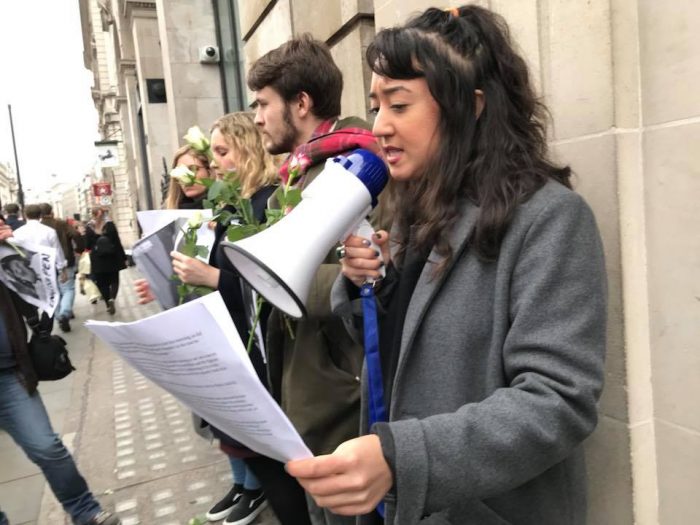 [/vc_column_text][/vc_column][/vc_row][vc_row][vc_column][vc_basic_grid post_type=”post” max_items=”4″ element_width=”6″ grid_id=”vc_gid:1509644448228-6e3e0e89-f48b-9″][/vc_column][/vc_row]
[/vc_column_text][/vc_column][/vc_row][vc_row][vc_column][vc_basic_grid post_type=”post” max_items=”4″ element_width=”6″ grid_id=”vc_gid:1509644448228-6e3e0e89-f48b-9″][/vc_column][/vc_row]
31 Oct 17 | Azerbaijan, Belarus, Czech Republic, Germany, Hungary, Italy, Malta, Media Freedom, Montenegro, News and features, Russia, Serbia
[vc_row][vc_column][vc_column_text]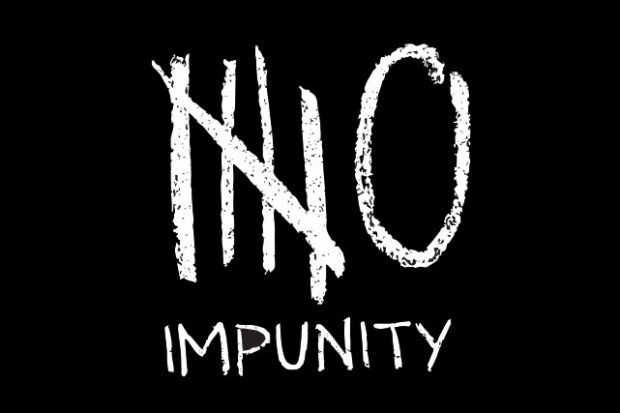
Since 2004, over 700 journalists have been killed for their reporting. Nine out of 10 of these cases go unpunished.
Index on Censorship’s Mapping Media Freedom platform verified a number of reports of impunity since it began monitoring threats to press freedom across Europe in May 2014. Reporters Without Borders also tracks cases of violence against journalists in its annual press freedom barometer and its end-of-year round-up of journalists killed worldwide.
“The brutal murder of Daphne Caruana Galizia on 16 October is a stark reminder of the dangers journalists face for reporting in the public interest. Pressure must be brought to bear on government officials in all countries to ensure that crimes against journalists do not go unpunished,” Hannah Machlin, project manager for Mapping Media Freedom, said.
Impunity, which is defined as the exemption from punishment or paying reparation for a crime, goes hand-in-hand with authorities’ inaction when investigating both violent and nonviolent actions against journalists.
“Violence against journalists and impunity for their attackers has become all too common in many parts of the world, and alarmingly, is on the rise in Europe, particularly in cases of journalists investigating corruption. We reiterate our call for the creation of a UN Special Representative for the Safety of Journalists to address this vicious cycle”, said Rebecca Vincent, UK Bureau Director for Reporters Without Borders.
To condemn such crimes, increase accountability and defend the rights of media professionals, the United Nations General Assembly proclaimed 2 November as the ‘International Day to End Impunity for Crimes Against Journalists’ in 2013. It has since been observed to raise awareness of impunity and condemn violence against the media.
AZERBAIJAN
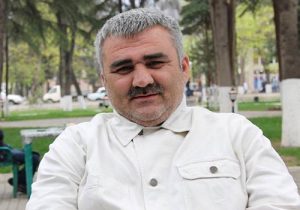
Azerbaijani journalist Afgan Mukhtarli
On 29 May 2017, investigative journalist and government critic Afgan Mukhtarli disappeared on his way home in Tbilisi, Georgia. Mukhtarli reappeared the next day across the border in Azerbaijan and was accused of illegal border crossing, resisting police and smuggling when police allegedly found €12,000 on his person. He was immediately sentenced to three months in pre-trial detention.
This case is unique in that it is the first cross-border operation alleged to be accompanied by the Georgian government. Azerbaijani lawmaker and a member of the Parliament Human Rights Committee Elman Nasirov claimed Mukhtarli’s kidnapping was “the most successful operation carried out in recent years”. Nasirov also accused him of being a member of a broader anti-Azerbaijan network. As a preventive mechanism, Nasirov claimed that Azerbaijani special forces made necessary arrangements with Georgian special forces.
Police have questioned political activists, members of opposition parties, and journalists as part of the investigation. Sevinc Vagifqizi, a freelance reporter, was detained while waiting outside the state border services where Mukhtarli was being held. Other journalists who have been questioned in the case of Mukhtarli are investigative journalist Khadija Ismayilova, who is facing a travel ban despite her release from jail, and more recently, Aytac Ahmadova.
The circumstances of Mukhtarli’s arrest were also notable for the suspicious injuries he sustained. Outside of his abduction, Mukhtarli’s lawyer reported that he had suffered a broken nose, multiple bruises and a possible broken rib.
BELARUS
On 12 March 2017, Adarya Hushtyn, the editor for BelaPAN news agency, arrived from Minsk to the town of Orsha in the Vitsebsk region of Belarus to cover a protest against the tax on the unemployed which was to be held in the early afternoon.
When she arrived that morning, she was stopped at the railway station by the commander of the riot police squad to check her documents and press card. She was then detained by police officers together with Nasha Niva newspaper correspondent Siarhei Hoodzilin who had arrived to cover the same protest.
At the police station, both journalists were searched and informed that they were being checked for in the database of wanted people. Hushtyn was detained at the police station for nearly three hours without any explanation. She was only released after the protest she intended to report on was over.
Hushtyn filed a complaint against her illegal detention and was told that she was mistaken for another woman who was also wanted by the police. As it turned out, this woman was not only unlike the journalist but was found two weeks prior to Hushtyn’s detention. She also filed an application to the prosecutor’s office to initiate a criminal case under Article 198 of the Criminal Code of the Republic of Belarus “preventing from lawful professional activity of a journalist”, but was refused.
In March 2017, the Belarusian Association of Journalists (BAJ) made an appeal to the Minister of Home Affairs calling on the authorities to investigative the mass violations of journalists’ rights. The reply was that police officers did not violate any law and that BAJ “has to stop ‘covering up’ and ‘justifying’ the people who have nothing to do with mass media”.
In March alone, 94 reporters were detained and 6 were beaten by the police while covering nationwide protests.
CZECH REPUBLIC
In April 1992, Václav Dvořák was shot and killed in front of his home. Dvořák was a journalist who uncovered information regarding František Mrázek, a controversial Czech entrepreneur once believed to be the boss of the Czech mob. Dvořák both published his reports locally or passed them along to national distributors. There are thirteen other murders thought to be linked to Dvořák’s.
After more than fourteen years, police identified Dvořák’s killer as gangster Bohuslav Hájek, who is believed to have been ordered by Mrázek to carry out the murder. However, Hájek disappeared in 2001 and it is believed that he was also murdered as an inconvenience and a witness to Mrázek’s operations.
GERMANY
On 6 July 2017 in Hamburg, Germany, police assaulted a number of journalists at the G20 protests.
Of the 35 investigations launched, 27 are accusations of assault perpetrated by police officers. At this time, none of the attackers have been arrested or convicted.
“There has been no police brutality,” Olaf Scholz, the mayor of Hamburg, claimed days after the protests during a televised interview.
On 8 July 32 journalists had their accreditation revoked by federal police without explicit reasoning. This launched an investigation by federal police, who discovered police files against the journalists contained incorrect information. Although there were errors made in police documents, it is unclear if the journalists have regained accreditation.
Journalists who lost accreditations include photographer Björn Kietzmann, Rafael Heygster (Weser Kurier), photographer for Junge Welt, Willi Effenberger Alfred Denzinger (Beobachter News), photographer Chris Grodotzki (Spiegel Online), Adil Yigit (Avrupa Postasi), editor Elsa Koester (Neues Deutschland) and freelance photographer Po Ming Cheung.
HUNGARY
On 15 July 2016 investigative journalist Csaba Móricz was insulted and then chased by the mayor of Érpatak, Orosz Mihály Zoltán, in a car. Earlier that day, Móricz went to Érpatak to document a city council meeting where he expected to ask questions to the mayor regarding a series of financial irregularities that he had uncovered.
At the beginning of the council meeting, instead of opening, the mayor launched into a fifteen-minute speech about the journalist, declaring him a “media rat” and “secret agent” several times, insinuating that Móricz lied about the financial situation in Érpatak for money. Two men then entered the room, one of which was Richárd Fügedi, a councillor of the far-right party Jobbik. One of the men then started threatening the journalist and asked: “Are you going to push me, Mr Móricz?“
The journalist left and drove away from the meeting, but soon realised that his vehicle was being followed by a group of three other cars – two of which belonged to the mayor‘s office. All cars involved were driving above the speed limit towards a nearby town when the journalist noticed a police patrol and decided to stop and ask for protection.
The police officers, instead of protecting the journalist, checked Móricz’s ID in the midst of a group of five people, including Mayor Zoltán and a second Jobbik MP. The group filmed the incident despite the journalist requesting they stop when his personal details, including his home address, were read aloud. Móricz had to insist to the police officers that they escort him to safety after initially being refused.
Just one month later, the authorities have opened an investigation against Móricz for breaking the speed limit. The investigation began when the website he works for wrote that he had to speed up to 140-150 km/h to escape his followers.
ITALY
Cosimo Cristina was born in Termini Imerese, an industrial village not far from Palermo, in 1935. He started working in the local newspaper L’Ora di Palermo when he was twenty. Later, he became a freelance contributor for several national newspapers and for the ANSA news agency.
In the late 1950’s, Cristina started to collect information about the clans of the Cosa Nostra, or the Sicilian mafia, in Palermo and Termini Imerese. In 1959 he published a new magazine titled “Prospettive Siciliane” (Sicilian Perspectives) with his friend Giovanni Capuzzo to cover stories on the mafia. This is when he started receiving death threats.
On 3 March 1960, he did not return home from work. Two days later, his corpse was discovered near to the railway, his skull broken. In his pockets he carried an ID and two letters; one for his fiancé and one for Capuzzo. In these letters Cristina begged for forgiveness for taking his own life. For the police it was a suicide and the case was closed. There was no further investigation or handwriting analysis on the letters found at the scene.
Five years later, police officer and expert on the Sicilian mafia Angelo Mangano began a new investigation. He knew Cristina had written several articles probing into the world of the Cosa Nostra. Mangano requested an autopsy on the corpse but the results confirmed the suicide, despite the doubts.
MALTA

Daphne Caruana Galizia
On 16 October at around 3pm, Daphne Caruana Galizia was killed when the car she was driving exploded in Bidnija in what is thought to have been a targeted attack. Galizia filed a police report 14 days prior saying that she was being threatened.
“The barbaric murder of Daphne Caruana Galizia is an attack on journalism itself. This crime is meant to intimidate every investigative journalist,” said Dr Lutz Kinkel, managing director of the European Centre for Press and Media Freedom.
“Because prime minister Joseph Muscat and parts of Malta’s political elite were targets of Galizia’s disclosures, we strongly recommend an independent investigation of this case. The killers have to be found and put on trial.”
On 17 October, Galizia’s family filed an application to Magistrate Consuelo Scerri Herrera to abstain from investigating the case because of the court’s “flagrant conflict of interest”. Galizia and the magistrate share a history of conflict and critique.
Galizia has conducted numerous high profile corruption investigations and has been subject to dozens of libel suits and constant harassment. Because of her research, in February, her bank assets were frozen following a request filed by the economic minister.
Galizia has made numerous opponents in the Maltese government and business world and has investigated and linked such high officials as opposition leader Adrian Deliato offshore accounts and alleged prostitution, real estate investment owner Silvio Debono to public land takeover and Prime Minister Joseph Muscat and his wife to hiding payments from Azerbaijan.
London: Vigil for Daphne Caruana Galizia
Join us to mark the International Day to End Impunity for Crimes Against Journalists by joining a vigil mourning the death of Maltese investigative journalist Daphne Caruana Galizia, who was murdered on Monday 16 October.
When: Thursday 2 November 1-2pm
Where: Malta High Commission, Malta House, 36-38 Piccadilly, Mayfair, London W1J 0LE (Map)
MONTENEGRO
On 1 November 2007 Tufik Softic, a Montenegrin journalist and reporter for the opposition daily newspaper Vijesti, was brutally beaten in front of his home in Berane by two hooded assailants wielding baseball bats. About six years later in August 2013, an explosive device was thrown into the yard of Softic’s family home. It was not until 2014 and broad international pressure on Montenegro that both cases began formally investigating.
On 17 July 2014, police arrested two men in the town of Budva under the suspicion of involvement in the attacks against Softic. After questioning by the state prosecutor, who also confiscated their passports, the men were released on the same day.
Ten years after the initial attack in February 2017, Softic filed a lawsuit against the state for ineffective investigation. The lawsuit claims that the state is responsible for mental pain and fear which Softic suffered and will suffer because of the danger of re-attack, the Trade Union of Media of Montenegro reported. The state, TUMM continued, “encouraged attackers by ineffective investigation and eventually, its ending”.
After years of stalemate, Softc initiated the trial for compensation for non-pecuniary damage related to human rights violations. He has since been awarded €7,000 as compensation for the ineffectual investigation and mental suffering he endured, becoming the first in Montenegro’s history to do so. Softic’s case is emblematic of the atmosphere of impunity in Montenegro and the broader Balkan region.
RUSSIA
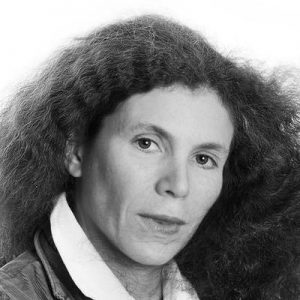
Yulia Latynina (Twitter)
After multiple life-threatening attacks, Yulia Latynina fled Russia. The columnist, contributor and writer works for independent newspaper Novaya Gazeta, as well as radio station Echo Moskvy.
“I have left Russia in connection with threats to my life,” Latynina wrote on Twitter on 10 September. A week before on 3 September, her car was set on fire and completely destroyed. On July 2017 the journalist’s car and parent’s house were sprayed with noxious gas which led to the poisoning of eight people in the surrounding area. In a third incident on August 2016, faeces were poured onto Latynina while she was on her way to work at Echo Moskvy station.
In all three cases, a proper investigation was not carried out and the perpetrators were not found.
Also in Russia, on 9 March 2016, an attack was made on a minibus carrying journalists and human rights activists, near the border between Ingushetia and Chechnya. After no suspects had been identified, the investigation was suspended in February 2017. Although Ingushetia resumed the investigation after a public backlash, no progress has been made.
SERBIA
Three controversial murder cases from the nineties and early 2000’s remain unresolved in Serbia, with the most well-known case being the murder of journalist and newspaper publisher Slavko Ćuruvija outside of his apartment in Belgrade in 1999. It is believed that the order came from senior secret service officials during the regime of strongman Slobodan Milošević. Four former state security officials have been on trial for the murder as of December 2014, which continues to progress slowly. The lack of closure to the case after nearly two decades shows the perpetuation of state impunity in Serbia even after regime change.
The suspicious death of journalist Dada Vujasinović in 1994 also remains unsolved. Vujasinović is believed to have been murdered because of her published articles regarding war criminal Željko Ražnatović, better known as Arkan. She was found dead in her apartment in 1994. The police ruled it a suicide and nobody has been arrested or prosecuted to this day.
The third case is that of Večernje Novosti journalist Milan Pantić, who was murdered in 2001. He reported on criminal affairs and official corruption. As of June 2017, the police investigation had finally been completed and suspects have been identified, awaiting a trial. All three of these cases are being investigated by an independent commission established in 2013.
UKRAINE
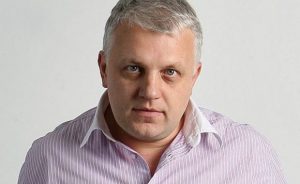
Pavel Sheremet (Photo: Ukrainska Pravda)
Journalist Pavel Sheremet‘s killing in a car bombing in Ukraine’s capital city on July 20, 2016, cast a chill over the country’s press corps, and the ongoing impunity for those behind the crime has continued to affect journalists’ ability to cover sensitive subjects.
Sheremet was killed when the car he was driving exploded in Kyiv. In a statement, Ukrainian police said that an explosive device detonated at 7.45am as Sheremet was driving to host a morning programme on Radio Vesti, where he had been working since 2015.
The car belonged to Sheremet’s partner, journalist Olena Prytula, who co-founded Ukrainska Pravda with murdered journalist Georgiy Gongadze.
Sheremet had been imprisoned by Belarusian authorities in 1997 for three months before being deported to Russia. Though stripped of his citizenship in 2010, he continued to report on Belarus on his personal website. He moved to the Ukrainian capital in 2011 to work for the newspaper Ukrainska Pravda.
There have been no arrests in the journalist’s murder.[/vc_column_text][/vc_column][/vc_row][vc_row][vc_column][vc_row_inner][vc_column_inner width=”1/2″][vc_single_image image=”80577″ img_size=”full” onclick=”custom_link” link=”https://www.balcanicaucaso.org/bloc-notes/Impunita-dei-crimini-contro-i-giornalisti-una-scelta-politica”][/vc_column_inner][vc_column_inner width=”1/2″][vc_column_text]
696 è il numero esatto di professionisti dell’informazione uccisi dal 2007 ad oggi nel mondo, secondo i dati raccolti dal Comitato per la Protezione dei Giornalisti (CPJ).[/vc_column_text][/vc_column_inner][/vc_row_inner][vc_row_inner][vc_column_inner width=”1/2″][vc_single_image image=”96211″ img_size=”full” onclick=”custom_link” link=”https://www.indexoncensorship.org/newsite02may/2017/10/targeting-journalists-name-national-security/”][/vc_column_inner][vc_column_inner width=”1/2″][vc_column_text]
As security – rather than the protection of fundamental rights and freedoms – becomes the number one priority of governments worldwide, broadly-written security laws have been twisted to silence journalists.[/vc_column_text][/vc_column_inner][/vc_row_inner][vc_row_inner][vc_column_inner width=”1/2″][vc_single_image image=”96229″ img_size=”full” onclick=”custom_link” link=”https://www.indexoncensorship.org/newsite02may/2017/10/turkish-injustice-scores-journalists-rights-defenders-go-trial/”][/vc_column_inner][vc_column_inner width=”1/2″][vc_column_text]
About 90 journalists, writers and human rights defenders will appear before courts in the coming days[/vc_column_text][/vc_column_inner][/vc_row_inner][vc_row_inner][vc_column_inner width=”1/2″][vc_single_image image=”96183″ img_size=”full” onclick=”custom_link” link=”https://www.indexoncensorship.org/newsite02may/2017/10/interpol-the-abuse-red-notices-is-bad-news-for-critical-journalists/”][/vc_column_inner][vc_column_inner width=”1/2″][vc_column_text]
Since August, at least six journalists have been targeted across Europe by international arrest warrants issued by Turkey, Azerbaijan, Uzbekistan and Kazakhstan[/vc_column_text][/vc_column_inner][/vc_row_inner][vc_custom_heading text=”Mapping Media Freedom” use_theme_fonts=”yes”][vc_separator color=”black”][vc_row_inner][vc_column_inner width=”1/4″][vc_icon icon_fontawesome=”fa fa-times-circle” color=”black” background_style=”rounded” size=”xl” align=”right”][/vc_column_inner][vc_column_inner width=”3/4″][vc_column_text]
Since 24 May 2014, Mapping Media Freedom’s team of correspondents and partners have recorded and verified over 3,600 violations against journalists and media outlets.
Index campaigns to protect journalists and media freedom. You can help us by submitting reports to Mapping Media Freedom.[/vc_column_text][/vc_column_inner][/vc_row_inner][/vc_column][/vc_row][vc_row][vc_column][vc_custom_heading text=”Don’t lose your voice. Stay informed.” use_theme_fonts=”yes”][vc_separator color=”black”][vc_row_inner][vc_column_inner width=”1/2″][vc_column_text]Index on Censorship is a nonprofit that campaigns for and defends free expression worldwide. We publish work by censored writers and artists, promote debate, and monitor threats to free speech. We believe that everyone should be free to express themselves without fear of harm or persecution – no matter what their views.
Join our mailing list (or follow us on Twitter or Facebook) and we’ll send you our weekly newsletter about our activities defending free speech. We won’t share your personal information with anyone outside Index.[/vc_column_text][/vc_column_inner][vc_column_inner width=”1/2″][gravityform id=”20″ title=”false” description=”false” ajax=”false”][/vc_column_inner][/vc_row_inner][vc_separator color=”black”][/vc_column][/vc_row]
31 Oct 17 | Magazine, News and features, Volume 46.03 Autumn 2017
[vc_row][vc_column][vc_custom_heading text=”From broadcasting uprisings to employing Russian spies, Radio Free Europe brings news to poorly served regions. In the autumn 2017 issue of Index on Censorship magazine, Sally Gimson looks at the station’s history and asks if it is still needed today”][/vc_column][/vc_row][vc_row][vc_column][vc_column_text]

Gregory Baldwin / Ikon
In Georgia, the future of Radio Free Europe, and sister station Radio Liberty, is looking precarious. This summer the Georgian government’s central broadcaster shut down two of RFE/RL’s most popular political programmes. The broadcaster said it was part of a wider restructure, but civil society organisations condemned the move and suggested the station wanted to eliminate critical viewpoints. The move and the subsequent outcry highlight the role RFE continues to play, namely to often act as a platform for free expression in parts of Europe where these values are strained.
Radio Free Europe and Russian station Radio Liberty, which it merged with, have been broadcasting to eastern Europe and Russia since 1950. While its remit originally was to fight communism, it now states its function as serving the cause of democracy more generally.
Today in Chechnya, for example, RFE is the only station where you will hear reports from journalists and stringers in the Chechen language about the influence of Isis and the persecution of gay people. It is the only Western international station operating in Moldova, even if it broadcasts for only a few hours a day. In Armenia, its TV provides a counterbalance to government-controlled media, as well as broadcasting to the wider diaspora. And in Kazakhstan, it provided special coverage of the early parliamentary election last year with six hours of live-streamed video on its website.
John O’Sullivan, executive editor of RFE between 2008 and 2012, argues passionately that “the radios”, as he calls the stations, have key roles to play in making sure people have a strong source of news and hear different viewpoints, and in holding governments to account with local journalists reporting on the ground.
“At the moment, there is a moral war between all these countries and the argument that commercial stations can do this job is fine, except they can’t do the job of the radios,” he told Index. “CNN is … never going to have a lot of correspondents in Armenia and never going to have correspondents in Chechnya. It’s going to be doing a story once every three months. Those audiences need it every day.”
Originally set up as an intelligence services-led project, RFE aimed to counter what the US government saw as superior propaganda coming out of the Soviet Union. Although primarily funded by the CIA, it was promoted to the US public as a project for truth and freedom to which they should contribute. Future US president Ronald Reagan, a young actor in the early 1950s, fronted up the public service advertisement, encouraging donations with the exhortation: “This station daily pierces the Iron Curtain with the truth, answering the lies of the Kremlin and bringing a message of hope to millions trapped behind the Iron Curtain.”
Victoria Phillips, who runs the RFE research project at Columbia University, told Index: “These men [who founded RFE] … really did believe in the power of truth and freedom of ideas, and when I read about some of those people, you don’t like the fact that they tried to invade places, and they had coups, but in the end the core was a belief in the power of ideas, and if ideas are allowed to vent then good will take place…”[/vc_column_text][vc_row_inner][vc_column_inner width=”1/3″][vc_icon icon_fontawesome=”fa fa-quote-left” color=”custom” align=”right” custom_color=”#dd3333″][/vc_column_inner][vc_column_inner width=”2/3″][vc_custom_heading text=”RFE was accused of encouraging insurgents to believe the USA would intervene on their behalf militarily” google_fonts=”font_family:Libre%20Baskerville%3Aregular%2Citalic%2C700|font_style:400%20italic%3A400%3Aitalic”][/vc_column_inner][/vc_row_inner][vc_column_text]In the beginning, the broadcasts used émigrés and dissidents for their programmes. They spoke from the headquarters in Munich to their countrymen and women in their own languages and were broadcast on short wave radios, which were widely accessible. It was an alternative source of news to the official Soviet broadcasters.
During the Cold War RFE was also a hotbed of spies, double agents and political resistance. The Bulgarian novelist and playwright Georgi Markov was assassinated in London with the tip of a poisoned umbrella in part because of his RFE In Absentia programme. Markov had dined with the communist elite and knew all about their lives. He revelled in satirising them and the absurdity of the system for his audience back home. According to the communist government he “insolently mocked” the regime and “encouraged dissidence”.
When O’Sullivan was executive director RFE/RL, he remembers the Iranian secret service taking pictures of the Iranian journalists coming into the offices, then in Prague, in an effort to intimidate them. “We know in a general way that some of the countries had agents embedded in the service which broadcast to them. We didn’t know who they were obviously. And in one particular case, in the Russian service, [there was] a man who had defected [back to Russia]. He had been in RFE during the Cold War and he defected and went to work for Radio Moscow and he subsequently wrote a tell-all memoir in which he had to confess that journalistic standards in Radio Moscow were well below the standards in Radio Free Europe, or in his case Radio Liberty.”
Later, RFE played an instrumental role in the fall of the USSR. As writer Irena Maryniak explained in an article for Index in 2010: “Western radios became a forum for dissenting views and personalities: people like Václav Havel (later president of the Czech Republic); the Russian physicist and civil rights activist Andrei Sakharov; the Polish historian Adam Michnik; or indeed maverick party members like Boris Yeltsin, who broadcast on Radio Liberty when he was out of favour with colleagues at home.”
Today, many of the 23 countries where RFE works are areas where the USA still wants foreign policy influence. It broadcasts across a huge range of media, not just radio. And the languages and countries the station covers, from the Caucasus and the Balkans to Afghanistan via Iran and Pakistan, read like a map of East-West tension.
Indeed, the congressionally funded Broadcasting Board of Governors, which has openly funded RFE since the 1970s and pours $117 million of taxpayers’ money into the service, is robust about its “soft power” intentions. Its 2016 budget report contains headings such as Countering a Revanchist Russia. And the report explicitly links broadcasting with foreign policy priorities.
So can we trust its journalism? The answer from O’Sullivan is yes. It’s not constrained to put the US view in the same way as Voice of America, and it actively seeks to encourage free speech and news coverage in countries where this is underdeveloped or difficult. Indeed, many reporters risk their lives to report for RFE, such as Khadija Ismayilova, who was imprisoned in Azerbaijan for exposing the president’s link to corruption. She was awarded the Unesco/Guillermo Cano World Press Freedom Prize in 2016 for her fearless work for the station. The station also won two prizes at the New York Festivals’ International Awards this spring, including one for the Kyrgyz service’s short video feature A Snowy Trek on Horseback to Teach School.[/vc_column_text][/vc_column][/vc_row][vc_row][vc_column width=”1/3″][vc_icon icon_fontawesome=”fa fa-quote-left” color=”custom” align=”right” custom_color=”#dd3333″][/vc_column][vc_column width=”2/3″][vc_custom_heading text=”The people who were broadcasting suddenly realised that there were huge ramifications if you promised, or seemed to promise, something and it didn’t come true.” google_fonts=”font_family:Libre%20Baskerville%3Aregular%2Citalic%2C700|font_style:400%20italic%3A400%3Aitalic”][/vc_column][/vc_row][vc_row][vc_column][vc_column_text]There have been darker moments at RFE, the most famous being its reporting on the Hungarian uprising of 1956 when at least 2,500 people were killed and many more were forced into exile, imprisoned and deported. RFE was accused of encouraging insurgents to believe the USA would intervene on their behalf militarily and therefore making people risk their lives unnecessarily. A couple of its programmes offered tactical military advice, and one commentary told people not to give up their weapons.
George Urban, the director of the Radio Free Europe division at the time, admitted they got it wrong. He said: “The radio was young and inexperienced. After barely five years of broadcasting, its management was still testing the instruments and boundary lines of the Cold War and was simply not up to the task of responding with clarity or finesse to its first great challenge. Hungary, its baptism of fire, cost it dear.”
As Phillips said: “The people who were broadcasting suddenly realised that there were huge ramifications if you promised, or seemed to promise, something and it didn’t come true. That people were going to die; your friends were going to die.”
Despite these controversies, RFE has survived, in part because the US Congress has continued to invest in the European operation, if on a smaller scale than during the Cold War. But O’Sullivan believes “the radios” should be given a lot more money and are needed more than ever to compete with stations like Russia Today (with a budget of about $300 million in 2016) and Al Jazeera.
“I think that people will accept there is an argument for good journalism which gives the news about their own country to people whose country would like to deprive them of it, and good journalism which sets standards to which we hope the journalists in transitioning countries will aspire and gradually achieve,” he said.
This article was updated on 1 November 2017 to include additional information.[/vc_column_text][vc_row_inner][vc_column_inner][vc_column_text]This article first appeared in the Autumn 2017 issue of Index on Censorship magazine, an award-winning, quarterly magazine dedicated to fighting for free expression and against censorship across the globe since 1972. You can subscribe here or via Exact Editions here. [/vc_column_text][/vc_column_inner][/vc_row_inner][/vc_column][/vc_row][vc_row][vc_column][vc_custom_heading text=”From the Archives”][vc_row_inner][vc_column_inner width=”1/3″][vc_single_image image=”89160″ img_size=”213×289″ alignment=”center” onclick=”custom_link” link=”http://journals.sagepub.com/doi/pdf/10.1177/0306422011399691″][vc_custom_heading text=”Surviving Lukashenko ” font_container=”tag:p|font_size:24|text_align:left” link=”url:http%3A%2F%2Fjournals.sagepub.com%2Fdoi%2Fpdf%2F10.1177%2F0306422011399691|||”][vc_column_text]March 2011
James Kirchick looks at the climate for alternative media in the aftermath of the 2010 Belarus elections.[/vc_column_text][/vc_column_inner][vc_column_inner width=”1/3″][vc_single_image image=”94267″ img_size=”213×289″ alignment=”center” onclick=”custom_link” link=”http://journals.sagepub.com/doi/pdf/10.1080/03064228208533431″][vc_custom_heading text=”Extolling the communist party” font_container=”tag:p|font_size:24|text_align:left” link=”url:http%3A%2F%2Fjournals.sagepub.com%2Fdoi%2Fpdf%2F10.1080%2F03064228208533431|||”][vc_column_text]October 1982
Janis Sapiets questions whether Soviet broadcasting is partaking in censorship or responsibility to the party. [/vc_column_text][/vc_column_inner][vc_column_inner width=”1/3″][vc_single_image image=”94034″ img_size=”213×289″ alignment=”center” onclick=”custom_link” link=”http://journals.sagepub.com/doi/pdf/10.1080/03064228308533503″][vc_custom_heading text=”Censorship in retreat” font_container=”tag:p|font_size:24|text_align:left” link=”url:http%3A%2F%2Fjournals.sagepub.com%2Fdoi%2Fpdf%2F10.1080%2F03064228308533503|||”][vc_column_text]April 1983
Hungary’s best-known novelist writes on the craving in Eastern Europe for communication and exchanges of ideas.[/vc_column_text][/vc_column_inner][/vc_row_inner][vc_separator][/vc_column][/vc_row][vc_row][vc_column width=”1/3″][vc_custom_heading text=”Free to air” font_container=”tag:p|font_size:24|text_align:left” link=”url:%20https%3A%2F%2Fwww.indexoncensorship.org%2Fnewsite02may%2F2017%2F09%2Ffree-to-air%2F|||”][vc_column_text]Through a range of in-depth reporting, interviews and illustrations, the autumn 2017 issue of Index on Censorship magazine explores how radio has been reborn and is innovating ways to deliver news in war zones, developing countries and online
With: Ismail Einashe, Peter Bazalgette, Wana Udobang[/vc_column_text][/vc_column][vc_column width=”1/3″][vc_single_image image=”95458″ img_size=”medium” alignment=”center” onclick=”custom_link” link=”https://www.indexoncensorship.org/newsite02may/2017/09/free-to-air/”][/vc_column][vc_column width=”1/3″][vc_custom_heading text=”Subscribe” font_container=”tag:p|font_size:24|text_align:left” link=”url:https%3A%2F%2Fwww.indexoncensorship.org%2Fnewsite02may%2Fsubscribe%2F|||”][vc_column_text]In print, online. In your mailbox, on your iPad.
Subscription options from £18 or just £1.49 in the App Store for a digital issue.
Every subscriber helps support Index on Censorship’s projects around the world.
 SUBSCRIBE NOW[/vc_column_text][/vc_column][/vc_row]
SUBSCRIBE NOW[/vc_column_text][/vc_column][/vc_row]
30 Oct 17 | Campaigns -- Featured, Statements
[vc_row][vc_column][vc_column_text]
 The Bahraini authorities on Monday 30 October sentenced the mother-in-law, Hajer Mansoor Hasan (49), and brother-in-law, Sayed Nizar Alwadaei (18), of UK-based human rights defender Sayed Ahmed Alwadaei to three years in prison in reprisal for his work.
The Bahraini authorities on Monday 30 October sentenced the mother-in-law, Hajer Mansoor Hasan (49), and brother-in-law, Sayed Nizar Alwadaei (18), of UK-based human rights defender Sayed Ahmed Alwadaei to three years in prison in reprisal for his work.
Mansoor Hassan and her son Sayed Nizar Alwadaei were not in court for the sentencing in a trial criticised by UN experts and Amnesty International for fair trial violations, including torture, and as a reprisal against his human rights work. Hajer and Nizar each received three years in prison on fabricated charges of planting a “fake bomb” in January 2017, while Mr Alwadaei’s maternal cousin, Mahmood Marzooq (30), was acquitted from the “fake bomb” case but sentenced to a month and half in prison and charged a 100 Bahraini dinar fine for obtaining a dagger.
The three family members of Sayed Ahmed Alwadaei, director of advocacy at the Bahrain Institute for Rights and Democracy (BIRD), were arrested in Bahrain in March 2017. After days in detention, during which they were ill-treated and tortured into signing false confessions, they were presented with terrorism charges. During the interrogation, Mr Alwadaei’s family members were questioned extensively about his work in the UK.
Public prosecution evidence papers, seen by BIRD, found no physical evidence — DNA, fingerprints or otherwise — tying the Alwadaei family to the “fake bomb” they were alleged to have planted in January 2017. Their prosecution has depended entirely on confessions extracted under conditions of torture.
In September, six UN human rights experts expressed “grave concern” over the allegations of arbitrary arrest, detention, death threats and torture in relation to Mr Alwadaei’s family. The UN experts also expressed grave concern that the actions were intended to “intimidate and impair the human rights activities” of Mr Alwadaei. The UN Committee Against Torture has also raised significant concern over the “widespread acceptance by judges of forced confessions”.
The reprisals against the Alwadaei family began in October 2016, when Sayed Ahmed Alwadaei protested King Hamad of Bahrain’s arrival at 10 Downing Street to meet the British Prime Minister. Within hours of that protest, Mr Alwadaei’s wife, Duaa Alwadaei, who was travelling from Bahrain to the UK, was detained at Bahrain International Airport, interrogated for seven hours, barred from leaving the country and threatened. As reported by Human Rights Watch, an interrogator asked her, “Where shall I go first, shall I go to his family or your family?” Duaa Alwadaei was able to leave Bahrain following international pressure and the intervention of the US embassy in Bahrain. Five months later, her mother and brother were targeted for reprisals.
Sayed Ahmed Alwadaei, Director of Advocacy of BIRD said: “The lowest the Bahraini monarch can go is to come after my family because I protested his presence in the UK and dedicated my work to exposing his government’s horrific rights abuses. I was distraught to see my family suffer torture, persecution and interrogations about my activities. The judge relied on coerced confessions extracted under torture to convict them. I will not rest until they are freed and will do whatever I can to hold the perpetrators to account.”
Husain Abdulla, Executive Director, Americans for Democracy and Human Rights in Bahrain: “The ‘fake bomb’ charge is absurd, and today’s proceedings show how far Bahraini courts are willing to go to in jailing innocent people. The United States has encouraged this behaviour. When the Trump Administration drops human rights conditions and approves multi-billion dollar arms deals to Bahrain, they are saying that this abuse is acceptable in their eyes.”
Joy Hyvarinen, acting head of advocacy, Index on Censorship, said: “We call on the Bahraini government to immediately overturn its conviction of the family members of Sayed Ahmed Alwadaei as punishment for his work as an activist and a critic of the regime. These are reprisals for nothing more than peacefully holding opinions.”
Hajer Mansoor Hassan
Hajer Mansoor Hassan did not attend today’s court hearing, as the authorities failed to transfer her from detention to the courtroom. Since March, she has been held in the Isa Town Women’s Prison. On 24 October, Hajer announced a hunger strike along with three other women prisoners, demanding more humane treatment and the removal of a new glass barrier in the visitation centre. The hunger strikers’ demands were met yesterday, 29 October, when they ended their strike after six days. Hajer was repeatedly hospitalised in the past week as her health faltered in the course of the hunger strike.
International Outcry over Alwadaei ’s family reprisals; UK Responds Noncommittally
Hajer was sentenced on 30 October, alongside her son and nephew, in a political trial which has been described by Human Rights Watch, Amnesty International and six UN experts as a reprisal against the human rights work of BIRD’s Sayed Ahmed Alwadaei.
Last week, 16 NGOs sent letters to 11 state bodies, including the United Kingdom, United States and the European External Action Service, calling on them to take action ahead of the trial. Their voices are joined by 40 Members of the European Parliament, who have made similar calls to the European Union.
27 cross-party parliamentarians also wrote to the British Foreign Secretary Boris Johnson, stating “Despite this attack on his human rights campaigning here in Britain, our government has taken no discernible action to support Mr Alwadaei or his family.” They added, “The UK must not condone the flagrant human rights violations committed by the Bahraini authorities against innocent civilians for human rights campaigns that take place on British soil.”
The UK’s Middle East Minister Alistair Burt was asked whether the Foreign & Commonwealth Office had raised this case with the Government of Bahrain. He stated that “we continue to follow these cases closely” but did not state whether the British government had indeed raised the case.
1. 16 rights groups’ letter to the 11 States: http://birdbh.org/wp-content/uploads/2017/10/2017.10.26-NGOs-letter-on-Reprisals-Against-the-Alwadaei-Family_Final-.pdf
2. Breaches of the International Law perpetrated by Bahrain against the family members of Sayed Ahmed Alwadaei, prepared by Reprieve, (Attached)
3. 27 UK parliamentarians letter to Foreign Secretary Boris Johnson (attached)
4. The MEPs letter is available here: https://www.ecdhr.org/bahrain-meps-call-for-the-release-of-sayed-alwadaeis-family/
5. Read Sayed Ahmed Alwadaei’s comment on the Guardian about the ordeal his family is facing here: https://www.theguardian.com/commentisfree/2017/oct/24/daughter-stateless-uk-bahrain-torture-human-rights
[/vc_column_text][/vc_column][/vc_row][vc_row][vc_column][vc_cta h2=”HOW TO HELP” h4=”Write to your representatives” style=”custom” css=”.vc_custom_1509363600769{background-color: #b7b7b7 !important;}” custom_background=”#919191″]Tell them to call on the Bahraini authorities to release Hajer Mansoor Hasan and her son Sayed Nizar Alwadaei and to unconditionally drop all charges against them. The right to free expression must be upheld and there must be no reprisals.
Theresa May, Prime Minister of the United Kingdom
Office of the Prime Minister, 10 Downing Street, London, SW1A 2AA
Tel: 020 7219 5206
Email: [email protected]
Boris Johnson, Secretary of State for Foreign and Commonwealth Affairs
House of Commons, London, SW1A 0AA
Tel: 020 7219 4682
Email: [email protected]
Simon Martin, British Ambassador to Bahrain
21 Government Avenue, Manama 306, PO Box 114 Manama, Bahrain
Tel: + 973 17574100
Email: [email protected][/vc_cta][/vc_column][/vc_row]
28 Oct 17 | Azerbaijan, Azerbaijan Letters, Campaigns, Campaigns -- Featured, Europe and Central Asia, Statements
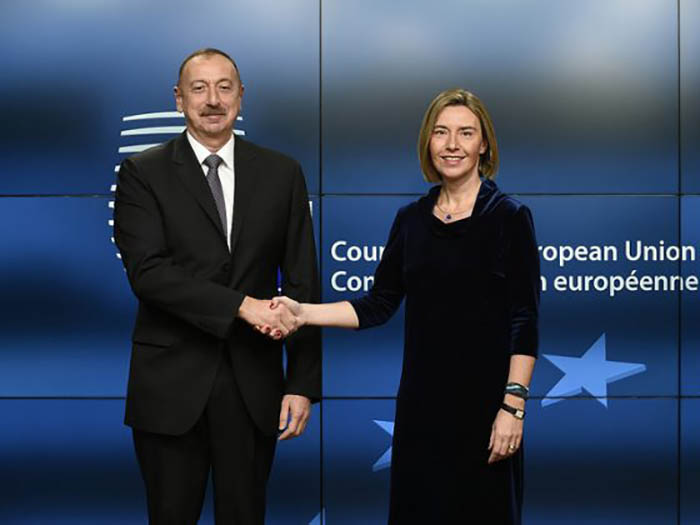
Federica Mogherini and Ilham Aliyev. Credit: EEAS/CC BY
A coalition of 37 human rights NGOs has sent a letter to the EU member state heads and EU leaders ahead of Azerbaijani President Ilham Aliyev’s visit to Brussels to participate in the 5th Eastern Partnership Summit on 24 November 2017. The NGOs urge the EU member state heads and leaders to use the summit to call on president Aliyev to end the current human rights crackdown in Azerbaijan and commit to concrete steps in this regard, including the release of individuals imprisoned on politically motivated charges and reforms of repressive NGO legislation.
The letter was sent on 27 October to the heads and foreign ministers of the 28 EU member states, as well as to EU High Representative for Foreign Affairs and Security Policy Federica Mogherini, EU Commissioner for European Neighbourhood Policy and Enlargement Negotiations Johannes Hahn, EU Commission President Jean-Claude Juncker, European Council President Donald Tusk and European Parliament President Antonio Tajani. The letter (as addressed to Federica Mogherini) can be read below or downloaded here.
Subject: Human Rights in Azerbaijan on the eve of the Eastern Partnership Summit
Brussels, 27 October 2017
Dear Ms Federica Mogherini,
We, the undersigned organisations, are writing ahead of Azerbaijani President Ilham Aliyev’s visit to Brussels to participate in the 5th Eastern Partnership Summit on 24 November. We urge you to use any opportunity you will have during the summit to call on president Aliyev to end the human rights crackdown and commit to concrete and sustainable human rights reforms in Azerbaijan. These include releasing individuals imprisoned on bogus, politically motivated charges; and reforming legislation that effectively prevents independent non-governmental organisations from operating and accessing funding.
Among the 20 Deliverables for the Eastern Partnership by 2020, the European Union has, notably, identified a vibrant civil society as a pre-requisite for “democratic, stable, prosperous and resilient communities and nations.”
Yet in recent years, the Azerbaijani government’s actions sharply contradict the latter and the spirit of this important Eastern Partnership commitment. Azerbaijan has adopted and enforced laws and regulations that severely restrict, rather than foster, a vibrant civil society. It has eliminated independent media, heavily filtered internet, and imprisoned and otherwise sought to silence independent journalists, civic and political activists who are essential to any kind of civil society envisaged by the Eastern Partnership.
The government’s continued crackdown on civil society and independent media has coincided with negotiations on the new, enhanced bilateral agreement between the EU and Azerbaijan. We firmly believe that the pace of those negotiations should largely depend on the progress Azerbaijan is willing to make in respect for fundamental rights.
Although in 2016 the government released 17 unjustly imprisoned human rights defenders and government critics, their convictions stand, and some face travel restrictions and are unable to do their work without undue government interference; those released on suspended sentences could also be sent back to prison. The authorities continue to use bogus, tax-related, and other politically motivated criminal charges to jail critical journalists and bloggers; at least 11 of them are currently in prison.
Azerbaijan is ranked 162nd out of 180 countries in Reporters Without Borders’ 2017 World Freedom Index. In May 2017, unidentified people abducted journalist Afgan Mukhtarli in neighbouring Georgia and illegally brought him to Azerbaijan, where the authorities pressed bogus criminal charges against him. In August, the authorities launched an investigation against Azerbaijan’s last remaining independent news agency, Turan, and a criminal case against its founder and chief editor, Mehman Aliyev, who is now under house arrest on trumped-up tax evasion and other charges. In May 2017, authorities blocked the websites of Azadliq, the newspaper of one of Azerbaijan’s main opposition parties, and of three news outlets that have to operate from abroad: Radio Free Europe/Radio Liberty (RFE/RL) Azerbaijan Service, Meydan TV, and Azerbaycan Saati. In March, a court sentenced Mehman Huseynov, the chairman of the Institute for Reporters’ Freedom and Safety (IRFS), and well-known anti-corruption blogger, to two years in prison for allegedly defaming the staff of a police station. Huseynov had publicized how several police officers arbitrarily detained and beat him, and used electric shock against him in January.
Many government critics or political opposition activists remain behind bars. Among them is Ilgar Mammadov, the leader of a pro-democracy opposition movement who in 2013 tried to run for president and who has been in prison since his arrest in early 2013 on fabricated charges of inciting violent protests. The government has ignored a judgment of the European Court of Human Rights and defied nearly a dozen resolutions by the Committee of Ministers of the Council of Europe calling for Ilgar Mammadov’s release. On 25 October, the Committee took the unprecedented decision and triggered the infringement proceedings against Azerbaijan, provided by Article 46 § 4 of the European Convention, following its failure to implement the Court’s judgment on Mammadov’s case. The proceedings could eventually lead to the Council of Europe sanctioning Azerbaijan, for example by suspending its voting rights in the Parliamentary Assembly.
Non-governmental organisations in Azerbaijan face serious obstacles to operating due to laws and regulations that require both donors and grantees to separately obtain government approval for every grant under consideration. The government has used broad discretion to deny this approval, and the authorities have convicted and imprisoned NGO leaders who failed to obtain it.
In January 2017, the Cabinet of Ministers slightly simplified the procedure by which non-governmental groups must register their funding, but this has not reduced the discretion the authorities have to arbitrarily deny funding approval.
Since 2015, Azerbaijan’s status in two international initiatives has been downgraded due to the government’s failure to meet specific commitments to foster civil society. These include suspension of Azerbaijan’s status by the Extractive Industries Transparency Initiative (EITI), which promotes revenue transparency in the gas, oil, and mining industries, and downgrading to ‘inactive’ status by the Open Government Partnership, a voluntary initiative promoting government transparency and accountability.
In October 2017, the Parliamentary Assembly of the Council of Europe adopted two strongly worded resolutions on Azerbaijan, urging the government to cease its unrelenting crackdown against critics.
At a time when the Azerbaijani government’s defiance of its civil-society commitments has prompted two standards-based organisations to downgrade Azerbaijan’s status, and has driven the Council of Europe member states to take unprecedented collective action on Azerbaijan’s blatant breach of the European Convention, the European Union appears eager to conclude a partnership agreement with the government.
The European Union is a values-based institution. While it has common interests with Azerbaijan, shared interests without shared values will not lead to a strong and reliable partnership. Instead, it is likely to lead to a situation in which Azerbaijan believes European values are negotiable. This risk is illustrated by recent investigations by the Organized Crime and Corruption Reporting Project revealing that members of Azerbaijan’s political elite were engaged in establishing and making use of a money laundering scheme and slush fund amounting to USD 2.9 billion, some of which was used to attempt to influence several European politicians to, among other things, whitewash Azerbaijan’s human rights record.
Under these circumstances, it is of the utmost importance that the EU leaders convey the message to President Aliyev that the conclusion of any new agreement between Azerbaijan and the EU, as well as the quality of the EU-Azerbaijan relationship, depends on the Azerbaijani government’s steps to address the EU’s human rights concerns. The EU would send the wrong political message to the Azerbaijani and other governments if it fails to bring meaningful political consequences for the continued detention of critics, human rights defenders and media professionals.
We urge the heads of the EU member states and the EU to abide by the obligations under article 21 of the Lisbon Treaty, as well as the commitments spelled out in the EU’s Strategic Framework for Human Rights and Democracy to “[…] promote human rights in all areas of its external action without exception”. In the most recent Foreign Affairs Council conclusions, the EU and its member states committed to “promoting stronger positions on civic freedoms and against any reduction in the space for civil society to act.”
During your meeting with President Aliyev, at the Eastern Partnership Summit, we urge you to insist on:
The Immediate and unconditional release of Ilgar Mammadov and the prompt and unconditional release of all other wrongfully imprisoned human rights defenders and civil society and political activists who were prosecuted in retaliation for their legitimate activities.
Absolute respect for free speech and media freedoms, including the prompt and unconditional release of all journalists and social media activists wrongfully put in detention; the dropping of all charges against Mehman Aliyev, and an end to the investigation against Turan.
An immediate end to the use of travel bans to arbitrarily restrict freedom of movement and professional activity, including in respect of investigative journalist Khadija Ismaiylova, human rights lawyer Intigam Aliyev, and others.
Reform of laws and regulations on nongovernmental organisations and their access to foreign funding, in accordance with the Venice Commission recommendations.
We thank you for your attention to this important matter.
Signatory organisations:
1. Amnesty International
2. ARTICLE 19
3. Austrian Helsinki Association – For Human Rights and International Dialogue
4. Barys Zvozskau Belarusian Human Rights House
5. Bir Duino
6. Center for Civil Liberties
7. Center for the Development of Democracy and Human Rights
8. Civil Rights Defenders
9. Crude Accountability
10. FIDH, International Federation for Human Rights
11. Freedom Files
12. Freedom House
13. Front Line Defenders
14. Helsinki Foundation for Human Rights
15. Human Rights Center “Viasna”
16. Human Rights Center of Republic of Azerbaijan (HRCA)
17. Human Rights Club
18. Human Rights Monitoring Institute
19. Human Rights Watch
20. Index on Censorship
21. Institute for Reporters’ Freedom and Safety (IRFS)
22. International Media Support (IMS)
23. International Partnership for Human Rights
24. Kazakhstan International Bureau for Human Rights and the Rule of Law
25. KRF Public Alternative
26. Libereco – Partnership for Human Rights (Germany/Switzerland)
27. Macedonian Helsinki Committee
28. Moscow Helsinki Group
29. Natural Resource Governance Institute (NRGI)
30. Netherlands Helsinki Committee
31. Norwegian Helsinki Committee
32. OMCT – World Organisation Against Torture
33. PEN International
34. Public Association “Dignity”
35. Public Verdict Foundation
36. Regional Center for Strategic Studies
37. Reporters Without Borders
27 Oct 17 | Campaigns -- Featured, Statements, Turkey, Turkey Statements
[vc_row][vc_column][vc_column_text]Leading freedom of expression organisations have submitted third-party interventions in ten cases against jailed Turkish journalists to which the European Court of Human Rights (ECtHR) has given priority status. The interventions offer detailed legal analyses of the principles at stake in the cases of the detained journalists.
The cases before the ECtHR concern the detention of board members from the Cumhuriyet newspaper, along with the cases of journalists Murat Aksoy, Şahin Alpay, Ahmet and Mehmet Altan, Ali Bulac, Ayse Nazlı Ilıcak, Ahmet Şık, Deniz Yücel, and Atilla Taş.
The separate interventions include submissions from the Media Legal Defence Initiative, PEN International, ARTICLE 19, the Association of European Journalists, the Committee to Protect Journalists, the European Centre for Press and Media Freedom, the European Federation of Journalists, Human Rights Watch, Index on Censorship, the International Federation of Journalists, the International Press Institute, the International Senior Lawyers Project and Reporters without Borders. The organisations worked with a group of British lawyers, including Eddie Craven of Matrix Chambers, in drafting the interventions.
The briefs urge the Court to hold that the detention of a journalist is “subject to the strictest scrutiny”, and that such measures in response to a journalist’s work can only be justified in “extreme and exceptional cases.” They underline that “the deliberate and arbitrary use of the criminal law to target journalists and other media for exercise of freedom of expression and opinion that may be critical of government for the ulterior purpose of punishing and preventing dissemination of critical opinions amounts to a violation” of the European Convention on Human Rights, to which Turkey is a state party.
“The extraordinary abuse of power by the Turkish state towards the detained journalists is symptomatic of a relentless crackdown on all dissenting voices since last July’s attempted coup. These journalists have been deprived of an independent and effective judicial system in their own country. These urgent cases before the ECtHR therefore are an opportunity to not only redress the injustice in these egregious instances but to give wider protection to the Turkish media and society as a whole,” said Sarah Clarke, PEN International.
“The volume of cases concerning detained Turkish journalists that are coming before the European Court are indicative of the dire state of press freedom in the country,” said Padraig Hughes, the Media Legal Defence Initiative’s Legal Director, “these cases offer the European Court an important opportunity to take a stand against the widespread deprivation of liberty of those who have been willing to criticise the Turkish Government, and to recognise that the real purpose behind these detentions is to deter journalists from speaking out in the future.”
“The number of Turkish cases on the Court’s docket should come as no surprise. While some journalists are released – such as Murat Aksoy and Atilla Tas this week – still others are detained. The revolving doors of Turkey’s jails just serves to underscore the arbitrariness of these detentions”; said Gabrielle Guillemin, Senior Legal Officer at ARTICLE 19. “With the independence of the Turkish judiciary under serious threat, the Court in Strasbourg is the last hope journalists have to obtain justice: these cases present the Court with a unique opportunity to protect freedom of expression in Turkey”; she added.
Turkey is currently the world’s largest prison for journalists, with over 150 currently in detention. Turkey has now been under a State of Emergency for 16 months, which has enabled an unprecedented repression of the free press and critical voices.
Third party interventions represent an additional tool to help promote and protect human rights at the European Court of Human Rights. They are an opportunity for civil society to assist the courts by providing an independent analysis of the human rights principles and standards at issue in a case, as well as any relevant international and comparative human rights law. The UN Special Rapporteur, David Kaye, and Council of Europe Human Rights Commissioner, Nils Muiznieks, have also intervened on these critical cases.[/vc_column_text][/vc_column][/vc_row][vc_row][vc_column][vc_custom_heading text=”Mapping Media Freedom” use_theme_fonts=”yes”][vc_separator color=”black”][vc_row_inner][vc_column_inner width=”1/4″][vc_icon icon_fontawesome=”fa fa-times-circle” color=”black” background_style=”rounded” size=”xl” align=”right”][/vc_column_inner][vc_column_inner width=”3/4″][vc_column_text]
Since 24 May 2014, Mapping Media Freedom’s team of correspondents and partners have recorded and verified 3,597 violations against journalists and media outlets.
Index campaigns to protect journalists and media freedom. You can help us by submitting reports to Mapping Media Freedom.[/vc_column_text][/vc_column_inner][/vc_row_inner][vc_separator color=”black”][/vc_column][/vc_row][vc_row][vc_column][vc_custom_heading text=”Don’t lose your voice. Stay informed.” use_theme_fonts=”yes”][vc_separator color=”black”][vc_row_inner][vc_column_inner width=”1/2″][vc_column_text]Index on Censorship is a nonprofit that campaigns for and defends free expression worldwide. We publish work by censored writers and artists, promote debate, and monitor threats to free speech. We believe that everyone should be free to express themselves without fear of harm or persecution – no matter what their views.
Join our mailing list (or follow us on Twitter or Facebook) and we’ll send you our weekly newsletter about our activities defending free speech. We won’t share your personal information with anyone outside Index.[/vc_column_text][/vc_column_inner][vc_column_inner width=”1/2″][gravityform id=”20″ title=”false” description=”false” ajax=”false”][/vc_column_inner][/vc_row_inner][vc_separator color=”black”][/vc_column][/vc_row][vc_row][vc_column][vc_basic_grid post_type=”post” max_items=”3″ grid_id=”vc_gid:1509113416127-927fc9f0-14f9-6″ taxonomies=”8862″][/vc_column][/vc_row]
26 Oct 17 | Events
[vc_row][vc_column][vc_single_image image=”96560″ img_size=”full” alignment=”center”][vc_row_inner][vc_column_inner width=”1/2″][vc_column_text]
Private view, charity sale
When: Tuesday 21 November 6-8pm
Where: Westminster Reference Library, 35 St Martin’s Street, London WC2H 7HP
Tickets: Free. Registration required via [email protected]
[/vc_column_text][/vc_column_inner][vc_column_inner width=”1/2″][vc_column_text]
Exhibition
When: 21 November to 7 December, Mon – Fri 10am to 8pm, Sat 10am to 5pm, Sun Closed
Where: Westminster Reference Library, 35 St Martin’s Street, London WC2H 7HP
Tickets: Free.[/vc_column_text][/vc_column_inner][/vc_row_inner][vc_row_inner][vc_column_inner width=”1/2″][vc_column_text]
Workshop
With Banx Cartoons and The Surreal McCoy
When: Saturday 25 November 2-4pm
Where: Westminster Reference Library, 35 St Martin’s Street, London WC2H 7HP
Tickets: Free. Registration required via Eventbrite.[/vc_column_text][/vc_column_inner][vc_column_inner width=”1/2″][vc_column_text]
Cartoons and censorship
A discussion with cartoonist Andy Davey, Jodie Ginsberg of Index on Censorship, Guardian and Index on Censorship magazine cartoonist Martin Rowson and via video link: Malaysian cartoonist Zunar and Robert Russell, Cartoonists Rights Network International.
When: Tuesday 28 November 6-8pm
Where: Westminster Reference Library, 35 St Martin’s Street, London WC2H 7HP
Tickets: Free. Registration required via Eventbrite.[/vc_column_text][/vc_column_inner][/vc_row_inner][vc_column_text]Join the UK’s Professional Cartoonists’ Organisation, Cartoonists’ Rights Network International and Index on Censorship – to try to bring the plight of persecuted cartoonists to the fore.
Repressive governments the world over fear cartoonists. Cartoonists get straight to the point.
Images remain in the public eye longer than do acres of type. While we in the UK and Europe generally accept often excoriating depictions of our leaders, this is definitely not the case in the rest of the world. Here, politicians actually applaud critical and often insulting drawings of themselves, sometimes even assembling personal collections thereof. Not so elsewhere. In at least one verified instance, a foreign cartoonist was visited by government agents and had his hands broken. Doubtless there are others.
Repressive governments, fearful of the truth, regularly imprison cartoonists.
This exhibition seeks to do that. Whilst it is not easy to highlight a repressive government’s treatment of any given cartoonist because that government will often react by threatening the cartoonist’s family and friends, any and all proceeds from this exhibition will go towards trying to alleviate the conditions many cartoonists the world over have to live with.
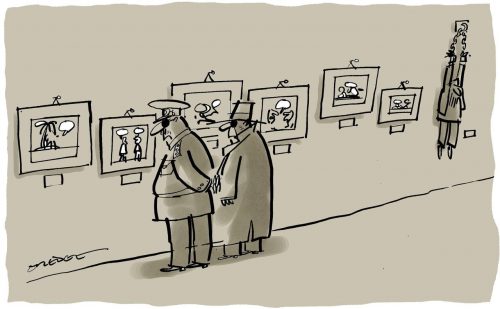
More information[/vc_column_text][/vc_column][/vc_row]
26 Oct 17 | Bahrain, Bahrain Statements, Campaigns -- Featured, Statements
[vc_row][vc_column][vc_single_image image=”91128″ img_size=”full” alignment=”center”][vc_column_text]Bahraini authorities yesterday transferred human rights defender Nabeel Rajab from a clinic to the notorious Jau Prison despite severe medical risks, subjecting him to humiliating treatment on arrival.
Prison officials have imprisoned Rajab in the very same cell in which he spent his previous two-year sentence. On arrival in Jau Prison, guards immediately searched him in a humiliating manner and shaved his hair by force. They further punished him by confiscating his books and clothes. Last night, guards raided his cell and began shouting; the prison officials also repeated their search of him in the middle of the night, in an apparent move to punish and humiliate the human rights defender.
One of Rajab’s charges is that he spoke out about the degrading treatment in Jau Prison, which he now endures himself. Yet Rajab is isolated from other prisoners convicted for speech-related crimes; he is instead detained in a cell with people convicted of being transgender, which is considered a criminal offence in Bahrain.
Yesterday Rajab’s wife had a call from Bahrain’s Criminal Investigative Directorate (CID) to tell her that her husband was to be transferred and she needed to collect his belongings, as he would no longer require them. This is the second week that prison officials have cancelled family visits with no explanation.
In early April 2017, Rajab was admitted to the Bahrain Defence Force hospital for vital surgery. He was transferred back to police custody just a day later, before having recovered from his operation, and his health deteriorated significantly. From there he was transferred to the Ministry of Interior Clinic (Al-Qalaa).
The previous month, in March 2017, Mohammad Sahwan died of sudden cardiac arrest in Jau Prison, the country’s largest long-term male detention facility. Sahwan was a victim of excessive use of force by police in 2012, and was the first political detainee to die in Jau Prison since 2011.
In early 2017, the Government of Bahrain intensified restrictions on inmates at Jau Prison, particularly targeting political prisoners and prisoners of conscience for increased abuse. Prison officials subjected the remaining eleven members of the “Bahrain 13” to severe deprivation of medical care.
Nabeel Rajab’s Charges
Rajab is currently serving a two-year prison sentence, after having been sentenced in absentia on 12 July to two years in prison on charges of “spreading false news” under article 134 of Bahrain’s Penal Code. His appeal began in September, but was this week postponed to 8 November for final arguments.
Rajab has been detained since his arrest on 13 June 2016. He was held largely in solitary confinement in the first nine months of his detention, violating the UN Standard Minimum Rules for Non-Custodial Measures (Tokyo Rules) which state: “pre-trial detention shall be used as a means of last resort in criminal proceedings, with due regard for the investigation of the alleged offence and for the protection of society and the victim.”
Rajab faces a concurrent trial in which he faces up to 15 years in prison on charges related to his tweets exposing torture in a Bahraini prison and criticising the humanitarian cost of the war in Yemen. In September 2017, a new set of charges were brought against Rajab related to social media posts made in January 2017, when he was already in detention and without internet access. Rajab also faces a fourth set of charges related to a letter he penned to the New York Times in September 2016. The UN Committee Against Torture has called for Rajab’s release.[/vc_column_text][/vc_column][/vc_row][vc_row][vc_column][vc_basic_grid post_type=”post” max_items=”12″ style=”load-more” items_per_page=”4″ element_width=”6″ grid_id=”vc_gid:1509026477209-453af21c-bd2e-0″][/vc_column][/vc_row]
26 Oct 17 | Bahrain, Bahrain Letters, Campaigns -- Featured, Statements
[vc_row][vc_column][vc_single_image image=”95197″ img_size=”full” add_caption=”yes” alignment=”center”][vc_column_text]Joint NGO letter to: Canada, Denmark, European Union External Action (EEAS), France, Germany, Italy, Norway, Sweden, Switzerland, United Kingdom, United States
We write to ask you to urgently raise, both publicly and privately, the case of Sayed Nazar Alwadaei, Hajar Mansoor Hasan and Mahmood Marzooq Mansoor with the Government of Bahrain ahead of the verdict in their criminal trial on 30 October 2017. These three individuals are relatives of Sayed Ahmed Alwadaei, a Bahraini human rights defender based in the United Kingdom, and his wife Duaa Alwadaei. Mr Alwadaei has been targeted by the Bahrain authorities for his human rights activism on numerous occasions and has been granted refugee status in the UK. We believe that Mr Alwadaei’s relatives are being prosecuted solely as a reprisal against him and the trial forms part of a pattern of harassment against his family.
On 26 October 2016, Mr Sayed Ahmed Alwadaei took part in a protest in London against King Hamad of Bahrain’s visit to the UK Prime Minister. Hours later, on the same day, his wife, Duaa Alwadaei, was detained along with her two-year-old son at Bahrain International Airport by Bahraini security forces. She was interrogated over seven hours and she was told she would not be allowed to leave Bahrain. During the interrogations, government officers reportedly made threats against her, her family and Mr Alwadaei’s family and she was told to deliver the threats as “a message to her husband.” Following international pressure and the intervention of the US embassy, on 1 November 2016 Mrs Alwadaei was able to leave Bahrain.
However, in March 2017, while Mr Alwadaei was attending the 34th session of the UN Human Rights Council in Geneva, Mrs Alwadaei’s brother Sayed Nazar Alwadaei, her cousin Mahmoud Marzooq Mansoor and her mother Hajar Mansoor Hassan were arrested in Bahrain. They all claim that they were subjected to ill-treatment, torture and extensively interrogated, including in relation to Mr Alwadaei’s life and work in the United Kingdom, without the presence of their lawyers. Mrs Hassan reportedly required hospitalisation on the first day of her detention. They were forced to sign confessions and were charged under Bahrain’s anti-terrorism law. If found guilty on 30 October, they face upwards of three years in prison each.
The treatment of the Alwadaei family has been the subject of international criticism. Six UN human rights experts raised “grave concerns” over the family’s allegations of torture, ill-treatment, arbitrary arrest and the apparent aim of the Government of Bahrain to “intimidate and impair Mr Alwadaei’s human rights activities”, including his participation at the UN Human Rights Council.
We therefore urge your government to request Bahrain to immediately release Mr and Mrs Alwadaei’s relatives ahead of their 30 October trial and drop all charges against them, and undertake prompt, impartial, independent and effective investigations into their allegations of torture and other ill-treatment. The findings of the investigation must be made public and anyone suspected of criminal responsibility must be brought to justice in fair proceedings. As this case is a part of a pattern of abuse and harassment against human rights defenders and their families in Bahrain, we urge you to call on Bahrain to cease all harassment of human rights defenders and their families.
Yours Sincerely,
Americans for Democracy & Human Rights in Bahrain (ADHRB)
Amnesty International
Article 19
Bahrain Centre for Human Rights (BCHR)
Bahrain Institute for Rights and Democracy (BIRD)
CIVICUS
English PEN
European Center for Constitutional and Human Rights (ECCHR)
European Centre for Democracy and Human Rights (ECDHR)
Gulf Centre for Human Rights (GCHR)
Index on Censorship
PEN International
REDRESS
Reporters Without Borders (RSF)
REPRIEVE[/vc_column_text][/vc_column][/vc_row][vc_row][vc_column][vc_basic_grid post_type=”post” max_items=”12″ style=”load-more” items_per_page=”4″ element_width=”6″ grid_id=”vc_gid:1509023634414-c2e4eb0c-cfba-5″ taxonomies=”716″][/vc_column][/vc_row]
26 Oct 17 | Index in the Press
If musicians can’t make music, then Sonos has nothing to play through its speakers. “We believe music changes lives,” says Sonos CEO Patrick Spence. “That isn’t possible without the artists that make it happen.” Read the full article

 Nearly 60 free expression advocates marked the International Day to End Impunity for Crimes Against Journalists by honouring the courage of investigative journalist Daphne Caruana Galizia, and call for justice in her case.
Nearly 60 free expression advocates marked the International Day to End Impunity for Crimes Against Journalists by honouring the courage of investigative journalist Daphne Caruana Galizia, and call for justice in her case.


 [/vc_column_text][/vc_column][/vc_row][vc_row][vc_column][vc_basic_grid post_type=”post” max_items=”4″ element_width=”6″ grid_id=”vc_gid:1509644448228-6e3e0e89-f48b-9″][/vc_column][/vc_row]
[/vc_column_text][/vc_column][/vc_row][vc_row][vc_column][vc_basic_grid post_type=”post” max_items=”4″ element_width=”6″ grid_id=”vc_gid:1509644448228-6e3e0e89-f48b-9″][/vc_column][/vc_row]





 The Bahraini authorities on Monday 30 October sentenced the mother-in-law, Hajer Mansoor Hasan (49), and brother-in-law, Sayed Nizar Alwadaei (18), of UK-based human rights defender Sayed Ahmed Alwadaei to three years in prison in reprisal for his work.
The Bahraini authorities on Monday 30 October sentenced the mother-in-law, Hajer Mansoor Hasan (49), and brother-in-law, Sayed Nizar Alwadaei (18), of UK-based human rights defender Sayed Ahmed Alwadaei to three years in prison in reprisal for his work.
